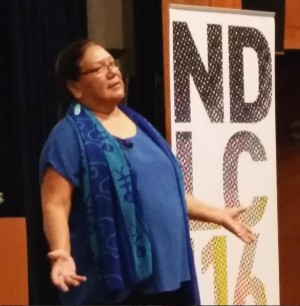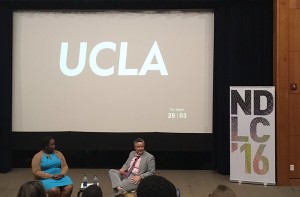Building Bridges at NDLC

NDLC opening keynote with Lakota Harden
Over 400 librarians from across the U.S. and Canada came together at the University of California, Los Angeles (UCLA) on August 10–13 for the National Diversity in Libraries Conference (NDLC), organized around the theme “Bridges to Inclusion.” Co-presented by the UCLA Libraries and the Association of Research Libraries (ARL), this was the first NDLC since 2010, when it was held at Princeton University. This year’s conference was a jam-packed four days of learning, listening, sharing, growing, and strategic planning, providing opportunities for much-needed support and connections among librarians committed to doing diversity work.
The event began on August 10 with a preconference that centered on disability advocacy, awareness, and accessibility. Workshops covered customer service, instruction and teaching, web design, procurement, exhibit design, and the intersection of race and disability. The preconference ended with a keynote by Mark A. Riccobono, president of the National Federation of the Blind, who spoke on “Driving Change: Individual Action and Institutional Excellence.” Riccobono exhorted attendees to stop seeing accessibility as a means of “fixing” things for specific members of the population and start seeing it as “making things better for us all.” He also noted, “We all know that separate and equal don’t go together. We want equally effective and equivalent ease of use.” Riccobono challenged the ways library professionals think about our services and resources to build them more inclusively and thoughtfully.
SETTING THE TONE
After the preconference, attendees gathered together for a special town hall on the Black Lives Matter movement, led by a panel of Library and Information Science (LIS) professors: Amelia Gibson of the University of North Carolina at Chapel Hill; Renate Chancellor of Catholic University of America, Washington, DC; Nicole Cooke of the University of Illinois at Urbana-Champaign; Sarah Dahlen of St. Catherine University, St. Paul, MN; Shari Lee of St. John’s University, Queens, NY; and Yasmeen Shorish of James Madison University, Harrisonburg, VA. The conversation centered on ways librarians can support one another in pushing for meaningful change at their respective institutions, given varying degrees of job security and privilege. The town hall, which was packed to capacity, helped to set a galvanizing tone for the rest of the conference and got everyone excited for the work that lay ahead.
STRENGTH, WISDOM, AND KNOWLEDGE
That buzz only grew more pronounced the following morning as Lakota Harden, Minnecoujou/Yankton Lakota and HoChunk orator, activist, community organizer, and poet, took the stage for the opening keynote. She was introduced by Jody Gray, director of the American Library Association (ALA) Office for Diversity Literacy and Outreach Services, a fellow Lakota. In her heartfelt introduction, Gray noted, “This is the first time in 15 years in LIS that I’ve been asked to introduce a fellow Lakota as speaker.” Indeed, when she took the stage Harden spoke openly and honestly about the ways in which diversity work often overlooks the unique struggles of indigenous people, who are too often the marginalized of the marginalized.
She also openly acknowledged her own sacrifices in agreeing to be at NDLC: “I want to be with my people protesting the [Dakota Access] pipeline, but I gotta be here doing this speech for you.” Nevertheless, Harden spoke of hope, drawn from ancestral strength, wisdom, and knowledge. Her talk was full of invocations of spirituality and power in the face of historical trauma that continues to do violence today: “We are colonized in a culture that has cut out the sacred…but we are going back to our humanity.” Harden closed her time with “We Shall Remain,” a video about the effects of historical trauma, and called on everyone to be effective allies: “To be good allies, we need to check ourselves. If we have privilege, we have to look out for those who don’t.”
TALKING INTERSECTIONALITY
The sessions over the next two days were similarly inspiring and deeply challenging. As part of learning to build “Bridges to Inclusion,” a key concept for the conference was intersectionality. Born out of black feminist thought and first introduced by legal scholar Kimberlé Crenshaw, intersectionality recognizes that identity and lived experience are multifaceted and multilayered in complex ways. Thus, in the presentations that comprised the session on “Assessing and Creating Spaces for Transgender Individuals” the main focus was on trans* identity, but attention was also paid to the ways that intersecting identities such as race/ethnicity, class, disability, and others can affect the experiences of a trans* person in the library space.
Likewise, in the session “Beyond the Word: Exploring Diversity in Academic Libraries,” current library diversity residents shared the ways in which their multiple intersections impact their treatment and experiences in their host institutions. In the session on “Library Diversity Training: From Awareness to Action,” librarian Kristyn Caragher and head of the undergraduate library and professor of library administration Lori Mestre, both from the University of Illinois at Urbana-Champaign, centered their work on an intersectional approach to anti-oppression work, taking into account the multiple ways in which oppression functions. (For more on Caragher’s work, please see her workshop materials). From sessions like “Going Native and Bridging Borders: Culturally-Based Literacy and Cultural Programs Serving Native Americans and Latino/as” to “Macro Impact of Microaggression: Exploring Microaggressions in Librarianship,” each presentation at NDLC centered on bridging the gap across multiple, intersecting identities.
”FREEDOM IS INDIVISIBLE”

April Hathcock and Chris Bourg close out NDLC with a conversation
In their closing keynote, Chris Bourg, director of Massachusettes Institute of Technology Libraries, and April Hathcock, scholarly communications librarian at New York University (and author of this article) spoke on “Bridges and Intersections: Traversing Whiteness in Libraries.” The two opted for an informal, open conversation to model what learning and growing together as allies can look like in spaces beyond the conference. Bourg, as a white, butch, lesbian, Army veteran, library director, and Hathcock, as a black, straight, cisgender, Christian, Southern, non-director, sat on stage and talked from the heart about the ways in which they are attempting to learn from and with each other along their varying intersections.
Their work, said Bourg and Hathcock, begins first and foremost with an acknowledgement that “libraries have never been, are not now, and will never be neutral,” that whiteness sits at the heart of our society and therefore our institutions. In acknowledging the “myth of neutrality,” they noted that anti-oppression work must be intentional and proactive: it cannot and will not happen by accident. Finally, the work has to happen across identities, bringing people from different backgrounds together for this common cause. Toward the end, Bourg quoted Nelson Mandela: “Freedom is indivisible.” The final word at NDLC came from Mark Puente, ARL director of diversity and leadership programs. He challenged attendees to take what they had discussed during the conference and translate it into meaningful action: “I don’t want this to be about best practices,” he said. “I want this to be about motivation and action.” Another NDLC is tentatively scheduled for 2020, with a Joint Conference of Librarians of Color slated for 2018.
RELATED
ALREADY A SUBSCRIBER? LOG IN
We are currently offering this content for free. Sign up now to activate your personal profile, where you can save articles for future viewing









Add Comment :-
Comment Policy:
Comment should not be empty !!!